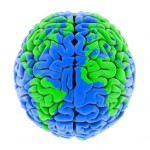•
the Blog
Does the Earth have a mind?
By Guillaume Filion, filed under
Turing test,
ecology,
consciousness,
Gaia theory.
• 19 October 2012 •
The life of Jean-Dominique Bauby took a dramatic turn on Friday 8 December 1995. On that day, he had a cerebrovascular accident that left him in a coma. When he woke up twenty days later, his body did not respond, his brainstem was damaged beyond repair. Able to move only his left eyelid, Jean-Dominique patiently wrote a whole book, The Diving Bell and the Butterfly, where he describes his experience.
In the past, it was known as a “massive stroke,” and you simply died. But improved resuscitation techniques have now prolonged and refined the agony. You survive, but you survive with what is so aptly known as “locked-in syndrome.” Paralyzed from head to toe, the patient, his mind intact, is imprisoned inside his own body, unable to speak or move. In my case, blinking my left eyelid is my only means of communication.
Up until his death, three days after the publication of the book, there was no doubt for anyone that Jean-Dominique had retained every aspect of his consciousness. There was no doubt that this motionless mass was genuinely conscious.
The Gaia hypothesis
 But how do we know that someone is conscious, what...
But how do we know that someone is conscious, what...
Lessons from Intelligent Design
By Guillaume Filion, filed under
evolution,
crimestop,
intelligent design,
consciousness,
creationism.
• 04 October 2012 •
 The first time I heard a friend of mine — a clever guy — claim that he does not believe in Evolution, I was speechless. Over the years I realized something important: he is not alone. As much as 40% of US citizens believe in strict creationism, while only ~ 15% believe in Evolution (source: Gallup polls).
The first time I heard a friend of mine — a clever guy — claim that he does not believe in Evolution, I was speechless. Over the years I realized something important: he is not alone. As much as 40% of US citizens believe in strict creationism, while only ~ 15% believe in Evolution (source: Gallup polls).
The latest incarnation of creationism, Intelligent Design, received some media attention during the trial of the Dover Area School District. Following the annoucement that Intelligent Design will be taught side by side with Evolution at the biology classes, a group of parents sued the public school district and finally convinced the judges that this constitutes a breach of the First Amendment of the constitution.
In essence, Intelligent Design claims to build on scientific observations. The rationale of the argument is that biological organisms, human beings in particular, are too complex to be the product of chance. They are designed. And if there is a design, there must be a designer.
Crimestop
If you have read George Orwell’s novel Nineteen Eighty-Four, you will perhaps remember the fictive language Newspeak. By removing words from the English vocabulary, the powers that be gradually enclose the...

